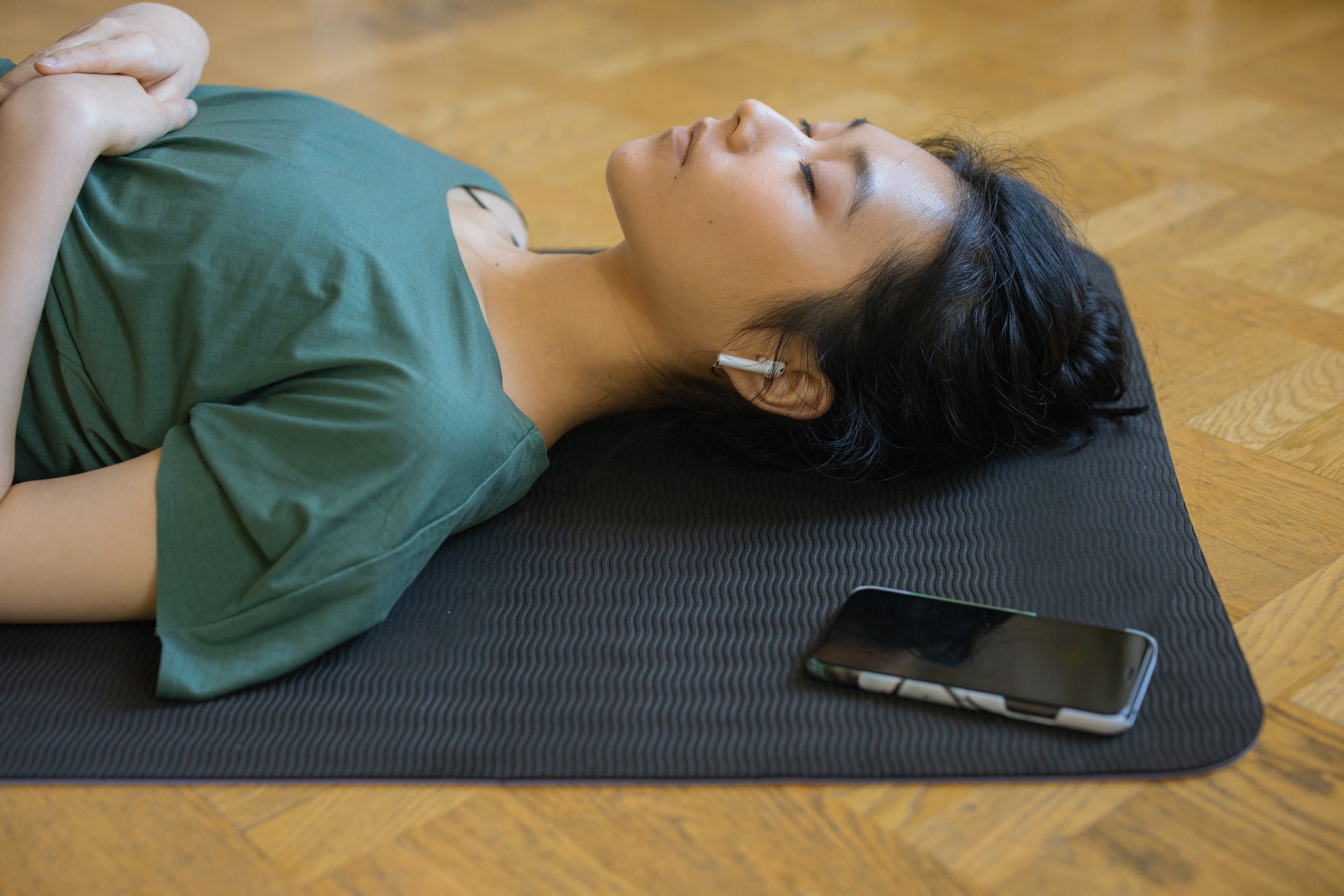Do you struggle to sleep at night?
By examining the scientific evidence, personal experiences, and expert insights, this blog post aims to shed light on the intriguing question: Can music help you sleep?
Whether you’re a seasoned insomniac or simply seeking ways to improve your sleep quality, harnessing the power of music might just be the harmonious solution you’ve been searching for.
Can Music Help You Sleep?
Music can help you sleep by reducing stress, synchronizing heart rate, and creating a calming environment conducive to restful sleep. It activates areas of the brain associated with relaxation and emotion, aiding the transition into sleep. Slow tempos and soothing melodies have been shown to promote relaxation and improve sleep quality.
Can Music Help You Sleep? – Interesting Facts
Here are five interesting facts about how music can help you sleep, along with sources to learn more:
- Music Reduces Stress Hormones: Listening to calming music before bed has been shown to reduce the levels of stress hormones like cortisol. This can create a more relaxed mental and physical state conducive to falling asleep. The effect of low-frequency sound stimulation on patients with fibromyalgia: A clinical study – PMC (nih.gov)
- Heart Rate Synchronization: Research suggests that slow-tempo music can synchronize with your heart rate and promote a more steady and relaxed rhythm, facilitating the transition into a restful sleep state.
- Improves Sleep Quality in Insomnia Patients: Studies indicate that music therapy can significantly improve sleep quality for individuals with insomnia. Specific music interventions tailored to individual preferences and needs have shown positive effects on sleep duration and sleep efficiency. The Effect of Music on the Human Stress Response – PMC (nih.gov)
- Incorporating Binaural Beats: Binaural beats are a unique audio phenomenon that involve playing slightly different frequencies in each ear, creating a third frequency in the brain. This technique has been explored for its potential to promote relaxation, reduce anxiety, and enhance sleep quality. Chronic hypoxia-hypercapnia influences cognitive function: a possible new model of cognitive dysfunction in chronic obstructive pulmonary disease – PubMed (nih.gov)
- Genre Matters: Different musical genres can have varying effects on sleep. While classical and ambient music are popular choices, other genres like soft rock and folk can also contribute to a calming environment. Finding the genre that resonates with you personally is key to optimizing its sleep-inducing benefits.
Importance of Quality Sleep and the Role of Music
Importance of Quality Sleep for Overall Well-being
In our fast-paced modern lives, quality sleep often takes a backseat to demanding schedules, endless tasks, and the allure of entertainment. However, the significance of sleep cannot be overstated when it comes to maintaining our overall well-being.
Sleep is not merely a time of rest; it is a crucial period during which the body undergoes numerous restorative processes that contribute to physical health, cognitive function, and emotional balance.
Adequate sleep has been linked to:
- Enhanced cognitive performance and memory consolidation
- Immune system support and healing
- Regulation of metabolism and weight management
- Emotional regulation and stress reduction
- Cardiovascular health and disease prevention
Without proper sleep, our bodies and minds are at risk of developing various health issues that can detrimentally affect our daily lives. As we delve deeper into the quest for improved sleep, it becomes essential to explore alternative methods that can help us achieve the restorative sleep we need.
Growing Interest in Alternative Methods to Improve Sleep
As our understanding of sleep continues to evolve, so does our approach to achieving restful nights. Traditional methods such as sleep medications have their place, but the desire for natural and holistic solutions is gaining momentum.
People are increasingly turning to alternative methods to improve their sleep quality, seeking approaches that align with their desire for balance and well-being.
These methods include practices like mindfulness, meditation, aromatherapy, and one particularly intriguing avenue: the use of music.
Preview of How Music Might Impact Sleep Quality
The concept of using music as a tool to enhance sleep quality is both ancient and contemporary. Throughout history, various cultures have recognized the soothing and transformative power of music, often incorporating it into rituals and healing practices.
In recent years, research has sought to uncover the relationship between music and sleep, and its potential to positively influence our nights of rest.
This chapter sets the stage for a deeper exploration into the potential benefits of using music as a means to improve sleep quality.
By examining the science behind sleep, the rising interest in alternative methods, and the preliminary findings regarding music’s impact on sleep, we’ll gain a clearer understanding of how melodies and harmonies might just be the missing piece to our sleep puzzle.
So, let’s journey into the realm of sleep science and music therapy to uncover the answers to the intriguing question: Can music truly help you sleep better?
The Science Behind Sleep and its Impact on Well-being
Stages of Sleep and Their Significance
Sleep is not a uniform state; it is a complex process composed of different stages, each serving a unique purpose in promoting overall well-being.
The sleep cycle consists of two main categories: REM (Rapid Eye Movement) sleep and non-REM sleep, each encompassing multiple stages. These stages include:
- NREM Stage 1: The transition between wakefulness and sleep, characterized by drowsiness and light sleep. This stage typically lasts for a few minutes.
- NREM Stage 2: A deeper stage of sleep where brain activity slows, and sleep spindles—brief bursts of rapid brain waves—occur. It’s a pivotal stage for memory consolidation.
- NREM Stage 3 (Slow-Wave Sleep): Often referred to as deep sleep, this stage is crucial for physical restoration, growth, and repair. It’s also the stage where the body releases hormones that regulate various bodily functions.
- REM Sleep: During this stage, vivid dreams occur, and brain activity becomes similar to that of wakefulness. REM sleep is essential for emotional regulation, cognitive function, and memory consolidation.
The cycling through these stages is essential for achieving restorative sleep. Disruptions in this cycle can lead to sleep deprivation and a myriad of health issues.
Factors Influencing Sleep Quality and Duration
Achieving optimal sleep quality and duration depends on a multitude of factors. External factors like noise, temperature, and light conditions influence sleep environments.
Lifestyle choices such as diet, exercise, and screen time also play a role. Additionally, individual variations in sleep needs further complicate the equation. While the standard recommendation is around 7-9 hours of sleep per night for adults, some individuals may thrive on less or require more.
Role of Relaxation and Stress Reduction in Promoting Better Sleep
One of the key elements in ensuring quality sleep is the ability to transition into a state of relaxation and calmness. Stress and anxiety have a profound impact on sleep quality, often leading to difficulties falling asleep or maintaining restful sleep throughout the night.
This is where relaxation techniques come into play. Practices like meditation, deep breathing, and progressive muscle relaxation can help soothe the nervous system, making the transition from wakefulness to sleep smoother.
As we explore alternative methods to improve sleep, the significance of relaxation becomes increasingly apparent. The ability to create a mental and physical environment conducive to relaxation is essential for ensuring a successful night’s sleep.
And this is where the potential role of music in promoting relaxation and reducing stress comes into focus.
In the next chapter, we’ll delve deeper into the history of using music for relaxation and how it might align with the goal of achieving better sleep quality.
The Soothing Power of Music: Historical and Neurological Perspectives
Historical Use of Music to Induce Relaxation
Throughout human history, music has held a special place in various cultures as a means of promoting relaxation and healing. Ancient civilizations, such as the Egyptians, Greeks, and Chinese, recognized the therapeutic effects of music and incorporated it into their rituals and practices.
In traditional medicine, music was often employed to restore balance and harmony within the body and mind. From indigenous chants to medieval melodies, the historical use of music to induce relaxation highlights its timeless connection to our well-being.
The Impact of Calming Melodies on the Nervous System
Recent scientific research has begun to shed light on the intricate relationship between music and the human brain.
Calming melodies have been found to have a measurable impact on the autonomic nervous system, which governs involuntary bodily functions such as heart rate, blood pressure, and digestion.
When exposed to soothing music, the parasympathetic nervous system—the branch responsible for relaxation—becomes more active, leading to a state of reduced physiological arousal.
This response is often referred to as the “relaxation response,” and it plays a pivotal role in preparing the body for restful sleep.
Benefits of Reducing Stress and Anxiety Through Music
One of the most profound effects of music on our well-being is its ability to alleviate stress and anxiety. Stressors from our daily lives can activate the body’s “fight or flight” response, causing the release of stress hormones like cortisol and adrenaline.
Over time, chronic stress can negatively impact sleep quality and overall health. Listening to soothing music triggers the release of endorphins, which are natural chemicals that counteract stress and enhance mood.
This not only helps reduce stress levels but also contributes to a more relaxed state conducive to falling asleep.
Moreover, music’s capacity to engage the brain’s emotional centres can distract us from worrisome thoughts and redirect our focus to positive sensations.
This diversion from racing thoughts provides a mental escape, allowing us to let go of the stressors that may otherwise keep us awake at night.
Incorporating music into relaxation routines or bedtime rituals can offer a practical and enjoyable way to combat the modern-day stresses that impede restful sleep.
As we continue to explore the potential of music in aiding sleep, the next chapter will delve into the specifics of how music impacts the sleep quality of individuals and the science behind this intriguing phenomenon.
Harmony of Sleep and Sound: Exploring Music’s Impact on Sleep Quality
The Relationship Between Music and Brain Activity
The intricate dance between music and brain activity offers a fascinating glimpse into the ways our auditory experiences can influence our neural pathways.
Neuroimaging studies have revealed that listening to music can activate multiple regions of the brain, including those associated with emotion, memory, and reward. The synchronization between the rhythms and melodies of music and the brain’s neural firing patterns creates a dynamic interplay that can either arouse or soothe the mind, depending on the musical composition and context.
Understanding this relationship provides insights into how music might be harnessed to optimize sleep quality.
Studies on Music’s Influence on Sleep Duration and Depth
Scientific inquiry into the connection between music and sleep has yielded intriguing findings. Research studies have explored the effects of music on both sleep duration and sleep depth.
Music’s ability to create a calming environment has been associated with prolonged sleep duration, potentially by reducing awakenings during the night.
Additionally, studies have shown that music can enhance slow-wave sleep—the stage critical for physical restoration and repair. This suggests that incorporating music into our pre-sleep routine might lead to more rejuvenating nights of slumber.
Personalized Preferences: How Genre and Tempo Matter
Just as musical taste varies from person to person, the impact of music on sleep quality can also be subjective. Individual preferences for musical genres, tempo, and instruments can influence how effectively music induces relaxation.
While some individuals might find classical compositions soothing, others might prefer ambient soundscapes or acoustic ballads. The tempo of the music also plays a role; slower tempos are generally associated with relaxation, while faster tempos may evoke different emotional responses.
Moreover, the context in which music is introduced matters. Creating a personalized playlist that aligns with individual preferences can contribute to a sense of comfort and familiarity, promoting a more relaxed state conducive to sleep.
As we delve into the practical applications of using music to improve sleep, considering one’s unique musical tastes becomes a valuable tool in crafting a sleep-inducing environment.
By understanding the neurological basis of music’s impact on sleep, reviewing research findings on sleep duration and depth, and recognizing the importance of personal preferences, we inch closer to uncovering how music can become a potent ally in our pursuit of restful nights.
The next chapter will delve into the practice of using binaural beats and ambient soundscapes to create a soundscape that supports a peaceful and rejuvenating sleep experience.
Sleep Serenades: Binaural Beats, Soundscapes, and Individual Sensitivity
Explaining Binaural Beats and Their Purported Effects
In the pursuit of harnessing music’s potential for enhancing sleep, the concept of binaural beats has emerged as a unique technique.
Binaural beats involve playing two slightly different frequencies in each ear, creating an auditory illusion that generates a third frequency—the binaural beat—within the brain.
The claimed effects of binaural beats on the brain include synchronization of brainwave patterns, promoting relaxation, reducing anxiety, and even facilitating access to different states of consciousness, such as meditation or deep relaxation.
While research is ongoing and opinions vary, binaural beats offer an intriguing avenue for those seeking innovative methods to improve sleep quality and overall well-being.
Rise of Ambient Soundscapes and Their Role in Sleep Environments
Ambient soundscapes, characterized by a soothing blend of natural sounds, instrumental melodies, and electronic textures, have emerged as a modern solution to creating conducive sleep environments.
These soundscapes aim to replicate the calming and immersive experiences found in nature, helping to mask disruptive noises and cultivate a sense of tranquillity.
Whether it’s the gentle rustling of leaves, distant waves crashing, or the soft hum of a flowing stream, these soundscapes offer an auditory cocoon for the mind to settle into, easing the transition into slumber.
Consideration of Individual Responses to Specific Auditory Stimuli
As with any approach to enhancing sleep, individual responses vary. What might be a lullaby for one person could be a jarring distraction for another.
It’s important to recognize that our perception of auditory stimuli is subjective and influenced by personal preferences, experiences, and sensitivities. While some individuals find solace in the symphony of nature sounds, others might respond more favourably to melodic tunes or even silence.
The key lies in experimentation and self-discovery. Trying different auditory stimuli, observing their effects on your sleep quality, and fine-tuning your sleep environment based on your responses can lead to a tailor-made approach that resonates with your unique needs.
In this chapter, we’ve explored the intriguing world of binaural beats, the comforting embrace of ambient soundscapes, and the significance of individualized auditory preferences.
As we move forward in our exploration of music’s role in sleep improvement, we’ll turn our attention to the professional practice of music therapy for sleep disorders and the guidance it offers to those seeking targeted solutions for their sleep challenges.
Sound Dreams: Music Therapy for Restful Nights
Exploring the Use of Music Therapy in Clinical Settings
The therapeutic potential of music extends beyond casual listening; it forms the basis of a formal discipline known as music therapy. This practice integrates the power of sound with evidence-based techniques to address a range of physical, emotional, and psychological concerns.
In the realm of sleep, music therapy is gaining recognition as a valuable tool in clinical settings to support those grappling with sleep-related issues.
Addressing Insomnia, Sleep Apnoea, and Other Sleep-Related Issues
Music therapy offers a holistic approach to tackling sleep disorders such as insomnia and sleep apnoea. The soothing properties of music can help alleviate anxiety and create a calming pre-sleep routine.
Guided by certified music therapists, individuals can learn techniques to synchronize their breathing and heart rate with musical rhythms, promoting relaxation and facilitating the transition into sleep.
For individuals with sleep apnoea, where disruptions in breathing during sleep lead to poor sleep quality, music therapy might be used to enhance breathing patterns and promote a more rhythmic and restful night’s sleep.
Professional Guidance and Integration of Music Therapy
While incorporating music into your sleep routine can be a personal endeavour, seeking professional guidance from a certified music therapist can provide personalized strategies tailored to your unique needs.
Music therapists have an in-depth understanding of the physiological and psychological effects of music on the human body, enabling them to craft interventions that align with your specific sleep challenges.
The integration of music therapy into your sleep improvement journey involves collaboration with a trained professional who can guide you through techniques such as music-assisted relaxation, mindfulness, and sensory modulation.
Through this collaboration, you can develop a comprehensive approach that considers not only the auditory aspect of music but also its emotional, cognitive, and physical effects.
In this chapter, we’ve explored the role of music therapy in clinical settings, its application in addressing various sleep-related issues, and the importance of seeking expert guidance for a comprehensive and targeted approach.
As we approach the concluding chapter of our exploration, we’ll recap the potential benefits of using music for sleep improvement and offer insights on how to integrate music into your nightly routine for maximum effect.
A Lullaby of Notes: Curating Your Sleep-Inducing Playlist
Factors to Consider When Curating a Sleep-Inducing Playlist
Crafting a sleep-inducing playlist is an art that blends science, personal preference, and the desire for peaceful slumber. Several factors should be taken into account as you curate your musical line-up:
- Tempo: Opt for slower tempos, generally ranging from 60 to 80 beats per minute, to match your resting heart rate and promote relaxation.
- Instrumentation: Choose instruments and sounds that evoke tranquillity, such as piano, strings, gentle wind instruments, or nature sounds.
- Lyrics: If you choose to include songs with lyrics, opt for soft and soothing vocals that won’t trigger emotional responses or stimulate your mind.
- Genre: While classical and ambient genres are popular choices, don’t be afraid to explore other genres that resonate with you.
- Transition: Consider the flow of your playlist, ensuring smooth transitions between tracks to maintain a continuous and uninterrupted auditory experience.
Sample Playlist: Incorporating Different Genres and Styles
Creating a diverse playlist can help you find the perfect balance between soothing familiarity and intriguing novelty.
Here’s a sample playlist that showcases the range of possibilities:
- “Clair de Lune” by Claude Debussy: A timeless piano piece that exudes serenity.
- “Weightless” by Marconi Union: An ambient track known for its calming effects, scientifically designed to reduce anxiety.
- “Spiegel im Spiegel” by Arvo Pärt: Minimalist composition with a meditative quality.
- “Gymnopédie No.1” by Erik Satie: A delicate and melancholic piano piece that encourages relaxation.
- “Ambre” by Nils Frahm: A contemporary instrumental track blending acoustic and electronic elements.
Balancing Familiarity and Novelty in Your Musical Choices
Striking a balance between familiar tunes and new discoveries can enhance the effectiveness of your sleep playlist.
Familiar songs can evoke comfort and trigger positive memories, while introducing new tracks prevents your mind from becoming overly engaged or desensitized to the music’s effects. Don’t hesitate to explore different sub-genres, artists, and cultural influences to keep your playlist fresh and intriguing.
Ultimately, your sleep playlist should reflect your unique tastes and needs. Experiment with different combinations, observe how specific tracks affect your sleep quality, and adjust accordingly.
Your sleep-inducing playlist is a personalized auditory haven that accompanies you on your journey to restful nights and rejuvenated mornings.
As we approach the final chapter of our exploration, let’s recap the potential benefits of integrating music into your sleep routine and provide a concluding perspective on the harmonious relationship between music and sleep.
The Melodic Prelude to Slumber: Perfecting Your Sleep Music Routine
Timing: When and How Long to Play Music Before Sleep
The timing of your musical interlude can significantly impact its effectiveness in promoting sleep. Aim to start your sleep music routine around 30 minutes before your desired sleep time.
This provides ample time for your body and mind to wind down and transition into a relaxed state. Playing music for an extended period before sleep can help signal to your body that it’s time to prepare for rest.
However, be mindful not to let the music run too long.
As your body begins to enter the sleep cycle, you’ll want to ensure that the music doesn’t interfere with your natural sleep patterns by playing all night. Setting a timer or using a playlist that gradually decreases in volume can help you maintain an optimal balance.
Volume and Ambiance: Setting the Right Atmosphere
The volume at which you play your sleep music is crucial. Opt for a volume level that’s soothing and gentle, allowing you to hear the melodies without feeling overwhelmed.
The goal is to create an ambiance that’s conducive to relaxation, not to recreate a concert hall experience.
Consider the environment in which you’re playing the music as well. Dim the lights, minimize external noises, and create a comfortable sleep space.
You might also explore the option of using a white noise machine or a fan to mask disruptive sounds and enhance the calming atmosphere.
Combining Music with Other Relaxation Techniques
Enhance the potency of your sleep music routine by combining it with other relaxation techniques. Incorporate deep breathing exercises, progressive muscle relaxation, or guided imagery to create a multi-sensory experience that engages both your auditory and physical senses.
As you immerse yourself in the tranquil soundscape, visualize yourself in a serene setting, or focus on the sensations of relaxation spreading throughout your body.
Combining music with these relaxation techniques can amplify the calming effects and help you cultivate a deeper state of relaxation. Moreover, this synergy between different approaches addresses both the mind and body, increasing the likelihood of a restful night’s sleep.
With an understanding of timing, volume, ambiance, and the power of combining techniques, you’re poised to fine-tune your sleep music routine into a personalized symphony of serenity.
As we approach the conclusion of our exploration, let’s recap the journey we’ve taken and the harmonious connection between music and sleep that you can now embrace for improved well-being.
Striking the Right Chord: Navigating Music’s Role in Sleep Improvement
Dependence on Music for Sleep
While music can be a powerful aid in improving sleep, it’s essential to avoid becoming overly dependent on it. Relying exclusively on music to fall asleep could potentially create a situation where you struggle to sleep without it.
The goal is to use music as a complementary tool rather than a crutch. As you incorporate music into your sleep routine, periodically try nights without it to gauge your ability to sleep naturally.
Overstimulation and Sleep Disruption
Music’s impact on sleep can vary from person to person. For some, certain types of music may lead to overstimulation, making it challenging to relax and fall asleep.
Fast-paced or emotionally charged music might evoke heightened mental activity, hindering the transition into slumber. Pay attention to your body’s response to different genres and styles, and opt for those that induce a sense of calmness.
Additionally, if your playlist contains sudden changes in volume or unexpected jarring sounds, it can lead to sleep disruptions. Ensure that your playlist is curated to maintain a consistent and soothing auditory experience.
Adjusting Strategies Based on Individual Responses
As you embark on your journey to harness music’s potential for sleep improvement, remember that individual responses are diverse and can change over time. What works one night might not be as effective on another.
Regularly evaluate how specific music tracks affect your sleep quality and make adjustments accordingly. Be open to experimenting with different genres, tempos, and relaxation techniques to refine your personalized sleep music routine.
Consider keeping a sleep journal where you record your experiences with different musical selections, noting any improvements or challenges you encounter. Over time, this journal can help you identify patterns and make informed decisions about your sleep music strategy.
With an awareness of the potential pitfalls and the importance of adaptability, you’re well-equipped to navigate the complexities of using music to enhance sleep quality.
As we approach the conclusion of our exploration, let’s reflect on the journey we’ve undertaken and the harmonious relationship between music and sleep that you now hold the keys to unlocking.
Conclusion: Can Music Help You Sleep? Unveiling Music’s Role in Sleep Enhancement
Recap of the Potential Benefits of Using Music for Sleep
Throughout our exploration, we’ve journeyed through the realm where music and sleep intertwine, uncovering a symphony of potential benefits.
From historical practices to contemporary studies, we’ve witnessed how music’s soothing melodies can influence brain activity, reduce stress, and enhance sleep quality.
The chapters have illuminated how music therapy offers holistic solutions for sleep disorders, and how personalized playlists can become the lullabies that guide us into tranquil slumber.
Encouragement to Explore and Experiment with Music’s Effects
As we conclude this exploration, consider yourself equipped with knowledge and insights that empower you to embrace music as a companion on your sleep improvement journey.
Embrace the curiosity to explore different genres, instruments, and relaxation techniques. Venture beyond the familiar to discover melodies that resonate deeply with your soul. Experiment with different strategies, noticing what enhances your sleep quality and what needs adjustment.
Emphasis on Holistic Sleep Practices for Overall Health
While music holds the potential to serenade you into restful nights, it’s important to remember that sleep improvement is part of a broader tapestry of holistic well-being. Alongside your melodic sleep routine, consider adopting other healthy sleep practices.
Maintain a consistent sleep schedule, create a comfortable sleep environment, limit screen time before bed, and engage in regular physical activity. The harmony of these practices, combined with the soothing notes of music, contributes to the symphony of vitality that defines your overall health.
In the rhythm of life, sleep is the quiet interlude that restores and rejuvenates. As you embark on your quest for better sleep, remember that you possess the power to orchestrate your nights with the melodies that resonate with your essence.
Let music be your guide, your comfort, and your catalyst for the rejuvenation that awaits in the embrace of dreams.
So, lay back, close your eyes, and let the melodic journey begin. May your nights be tranquil, your slumber profound, and your mornings filled with the sweet harmony of well-rested vitality.
Additional Resources: Nurturing Your Musical Path to Restful Nights
Recommended Studies and Research on Music and Sleep
If you’re eager to dive deeper into the scientific insights behind music’s influence on sleep, consider exploring these recommended studies and research articles:
- “The Effects of Music on Sleep Quality” – A comprehensive review of research on how music impacts sleep quality.
- “Binaural Auditory Beats Affect Vigilance Performance and Mood” – An investigation into the effects of binaural beats on cognitive performance and mood.
- “Music and Sleep in Young Adults” – A study examining the relationship between music listening habits and sleep patterns in young adults.
These studies offer valuable perspectives that can enrich your understanding of the connection between music and sleep.
Information on Certified Music Therapists and Sleep Specialists
If you’re considering delving into the realm of music therapy for sleep improvement, connecting with certified music therapists and sleep specialists is a wise step.
Reach out to organizations like the American Music Therapy Association (AMTA) or the American Academy of Sleep Medicine (AASM) to find professionals in your area who can guide you on your journey.
Remember that your pursuit of better sleep is an ongoing adventure, and these additional resources can serve as your compass, guiding you towards restful nights and rejuvenated mornings.
As you explore, experiment, and learn, may the harmonious blend of music and sleep become your steadfast companion on this path of wellness.








